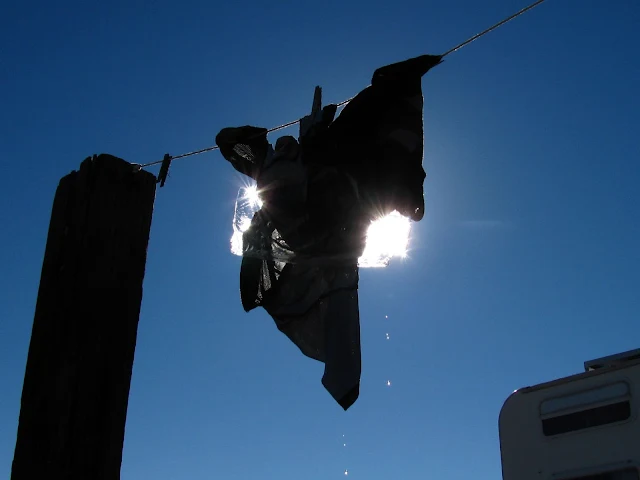When traveling down the Colorado River, there is an unusual pleasure to look forward to. Rubble. That's right, rubble. By the time you hit Lake Mead you will be a slave of the Colorado River for the next month or two. It doesn't start out well.
Near Lake Mead the rocks are razor sharp. Just reach down and touch the ground with your hand -- you almost need gloves. These ghastly rocks destroyed my rear mountain bike tire once -- it half exploded. This year I switched to an "enduro" rear tire with a heavier casing.
When your dog goes out for a romp, the little fuzzball almost needs doggie hiking boots unless you stay in the arroyos. Be sympathetic and avoid harsh surfaces.
But further downstream, in central Arizona, the rubble takes the form of desert pavement. And are you ever in the mood for it! Desert pavement is not too sharp. It can support the gigantic motorhomes that snowbirds "camp" with. Of course desert pavement varies in its support or tightness. In general upland areas, such as mountains, have razor rocks. Plains have desert pavement.
At times desert pavement is a bit shiny -- especially with the low angle of the winter sun. Near the winter solstice this dimming of the sun feels almost eerie, especially if a film of clouds mutes the usual abruptness of a desert sunrise. At this time of year, the fierce desert sun can only softly reveal itself. The desert pavement can be brighter than the sky.
The great sky god is weakening. It is hard to believe that this god can be anything other than mighty and wrathful. I wish I knew some German in order to appreciate Old English (Anglo-Saxon) words more. Etymology apps help a little. Isn't there some connection between the Germanic "Gotterdammerung" and this dimming of the fierce desert sky god?
This seems like a perfect opportunity for a photograph, but oddly enough I have never photographed these weak struggling solstice sunrises. Perhaps music is better than a camera at expressing moods. Consider the opening notes -- the musical sunrise -- of Brahms Piano Concerto #2.


Comments